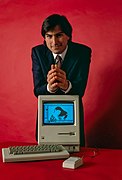Portal:Internet
The Internet PortalThe Internet (or internet) is the global system of interconnected computer networks that uses the Internet protocol suite (TCP/IP) to communicate between networks and devices. It is a network of networks that consists of private, public, academic, business, and government networks of local to global scope, linked by a broad array of electronic, wireless, and optical networking technologies. The Internet carries a vast range of information resources and services, such as the interlinked hypertext documents and applications of the World Wide Web (WWW), electronic mail, telephony, and file sharing. The origins of the Internet date back to research to enable time-sharing of computer resources and the development of packet switching in the 1960s. The set of rules (communication protocols) to enable internetworking on the Internet arose from research and development commissioned in the 1970s by the Defense Advanced Research Projects Agency (DARPA) of the United States Department of Defense in collaboration with universities and researchers across the United States and in the United Kingdom and France. The ARPANET initially served as a backbone for the interconnection of regional academic and military networks in the United States to enable resource sharing. The funding of the National Science Foundation Network as a new backbone in the 1980s, as well as private funding for other commercial extensions, encouraged worldwide participation in the development of new networking technologies and the merger of many networks using DARPA's Internet protocol suite. The linking of commercial networks and enterprises by the early 1990s, as well as the advent of the World Wide Web, marked the beginning of the transition to the modern Internet, and generated a sustained exponential growth as generations of institutional, personal, and mobile computers were connected to the network. Although the Internet was widely used by academia in the 1980s, the subsequent commercialization in the 1990s and beyond incorporated its services and technologies into virtually every aspect of modern life. (Full article...) Selected article
YouTube is a video sharing website where users can upload, view and share video clips. YouTube was created in mid-February 2005 by three former PayPal employees. The San Bruno-based service uses Adobe Flash technology to display a wide variety of video content, including movie clips, TV clips and music videos, as well as amateur content such as videoblogging and short original videos. In October 2006, Google Inc. announced that it had reached a deal to acquire the company for US$1.65 billion in Google stock. The deal closed on November 13, 2006. Unregistered users can watch most videos on the site, while registered users are permitted to upload an unlimited number of videos. Some videos are available only to users of age 18 or older (e.g. videos containing potentially offensive content). The uploading of pornography or videos containing nudity is prohibited. Related videos, determined by title and tags, appear onscreen to the right of a given video. In YouTube's second year, functions were added to enhance user ability to post video 'responses' and subscribe to content feeds. Few statistics are publicly available regarding the number of videos on YouTube. However, in July 2006 the company revealed that more than 100 million videos were being watched every day, and 2.5 billion videos were watched in June 2006.
Selected picture Wardriving is the act of searching for Wi-Fi wireless networks by a person in a moving vehicle using a Wi-Fi-equipped computer, such as a laptop or a PDA. It is similar to using a radio scanner, or to the amateur radio practice of DXing. News
Wikinews Internet portal
WikiProjects
Did you know (auto-generated) -
Selected biography
Mark Elliot Zuckerberg (born May 14, 1984) is an American computer programmer and entrepreneur. As a Harvard College student he founded the online social networking service Facebook with the help of fellow Harvard student and computer science major Andrew McCollum as well as roommates Dustin Moskovitz and Chris Hughes. He now serves as Facebook's CEO. Zuckerberg launched Facebook from his Harvard dorm room on February 4, 2004. It quickly became a success at Harvard and more than two-thirds of the school's students signed up in the first two weeks. Zuckerberg then decided to spread Facebook to other schools and enlisted the help of roommate Dustin Moskovitz. They first spread it to Stanford, Columbia and Yale and then to other Ivy League colleges and schools in the Boston area. By the beginning of the summer, Zuckerberg and Moskovitz had released Facebook at almost 30 schools. Zuckerberg moved to Palo Alto, California with Moskovitz and some friends during the summer of 2004. They leased a small house which served as their first office. Over the summer, Zuckerberg met Peter Thiel who invested in the company. Today, the company has four buildings in downtown Palo Alto.
General images -The following are images from various internet-related articles on Wikipedia.
Selected quoteMore Did you know...
Main topics
Featured contentCategoriesRelated portalsThings you can do
Associated WikimediaThe following Wikimedia Foundation sister projects provide more on this subject:
Wikipedia's portals |





















































